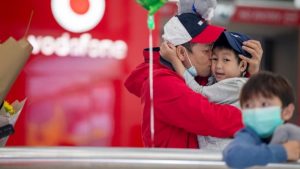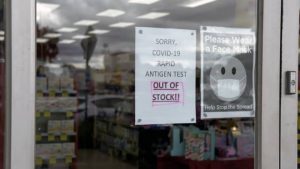Prime Minister Scott Morrison on Wednesday announced Australia will refund visa fees for vaccinated backpackers who arrive within the next three months.
The country — whose tight, pandemic border policies locked out its citizens, and more recently, one of tennis’s biggest stars — is encouraging backpackers to visit.
And it’s doing so because it wants to reduce labor shortages that have been made worse by Covid-19.
“My message to [backpackers] is come on down,” Morrison said this week. “You’ve got your visa, we want you to come to Australia and enjoy a holiday here in Australia, move all the way … around the country and the same time, join our workforce.”
The invitation applies to some 23,500 backpackers who already have visas to enter Australia as well as “anyone who applies for one and turns up within the next 12 weeks,” said Morrison, via the televised announcement.
Visas commonly obtained by backpackers — namely, the subclass 417 and 462 visas, known as “Working Holiday Makers” visas — let young adults who aren’t traveling with dependent children work and travel through Australia for up to one year.
Holders of these visas who arrive by April 19 can apply to have their fees of $495 Australian dollars ($358) refunded, according to Australia’s Department of Home Affairs.
International students with visas to study in Australia can also have their visa fees of $630 Australian dollars ($453) returned to them if they arrive in the next eight weeks, Morrison said.

The move is both “a thank you to them for coming back … but we also want them to come here and be able to be filling some of these critical workforce shortages, particularly those who are working and being trained in health care, aged care, those types of sectors,” said Morrison.
He said “the crest of this omicron wave is either upon us now or will come upon us in states over the next few weeks” and that opening the borders to backpackers and students would support Australia with “the challenges we’ll face in the weeks and months ahead.”
To attract backpackers and students to quickly travel to Australia, the country is launching a $3 million marketing program through its tourism agency, Tourism Australia, Morrison said.
Wanted: travelers who will work
Australia lost some 500,000 temporary migrants since closing its borders in March of 2020, according to a parliamentary report in August.
That resulted in a shortage of workers in sectors such as healthcare, entertainment, hospitality and aviation, a situation which was further exacerbated by a recent surge in omicron-linked infections that left many workers sick or isolating at home.

Morrison on Wednesday singled out agriculture and hospitality as two areas where incoming visa holders could help.
During the pandemic, foreigners with “critical skills” could enter Australia via a travel exemption if they worked in industries that supply essential goods and services, such as “aged care” and agriculture, according to Australia’s Department of Home Affairs’ website.
More than 45,000 “critical skills” travel exemptions have been granted during the pandemic, yet almost 50,000 such requests have been rejected, according to Home Affair’s Monthly Travel Exemptions Processing Report for December 2021.
The need for more help
Vaccinated eligible visa holders, including holders of Working Holiday Makers visas, have been able to enter Australia without applying for a travel exemption since Dec. 15, 2021.

Working Holiday Makers aren’t required to have specific skills but they are restricted to the types of jobs they can do as well as where they come from.
Passport holders from 19 countries and territories, including Canada, France, Germany, Taiwan and the U.K., are eligible for subclass 417 visas, while subclass 462 visa holders can hail from 26 countries, including the United States and Singapore.
A sharp rise in cases
The move to give financial incentives to backpackers is seemingly at odds with the closed-door tourism policy Australia has had in place for much of the pandemic.
Morrison’s announcement comes as he faces criticism over a surge of Covid-19 cases that has driven up infection and hospitalization rates, and which resulted in a record number of deaths on Tuesday.
The country, which had few daily cases for much of 2020 and the first half of 2021, now has more than 550,000 active cases, according to Australian’s Department of Health.

Carla Gottgens| Bloomberg | Getty Images
Hospitals in the state of Victoria, home to Melbourne, moved to “Code Brown” emergency status this week, a level typically reserved for natural disasters or large-scale accidents, according to local media. It’s the first time such declaration has been made across the entire state, according to local reports.
The prime minister’s ratings slid this week, according to Reuters, months ahead of a vote where he will seek re-election.
The poll was conducted before he ousted Djokovic from the country, a move that was popular among Australians.
SOURCE: CNBC NEWS

